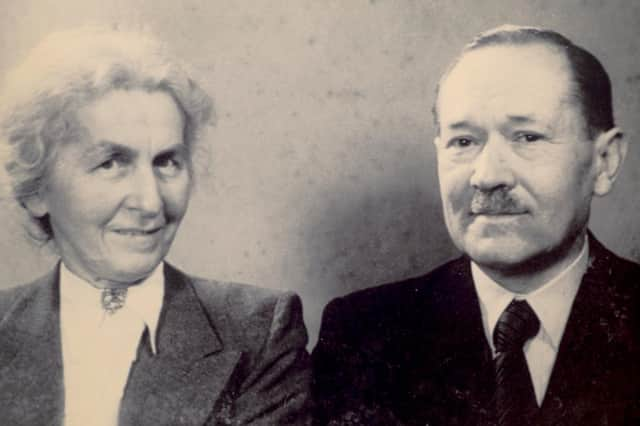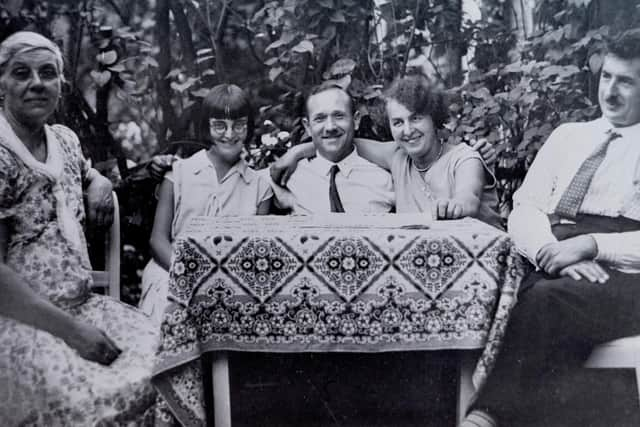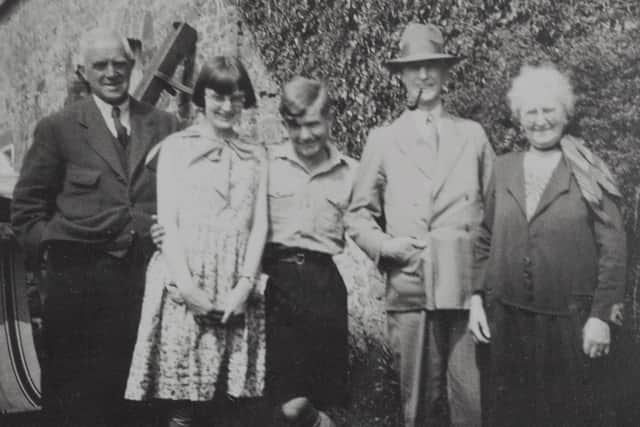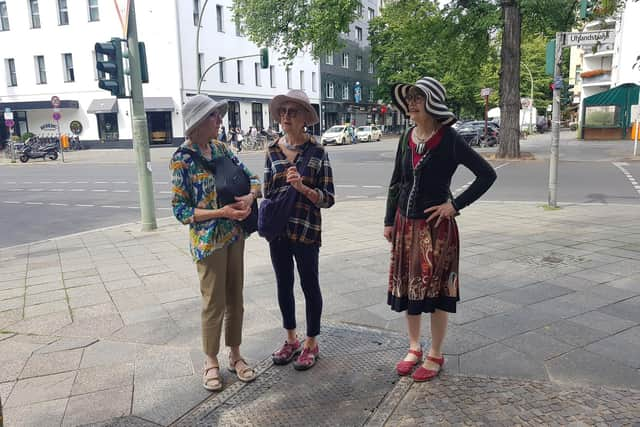The forgotten World War II heroes who saved Jewish families in Berlin with a helping hand from Lancashire


The year is 1929. It's summertime in Berlin. Sixteen-year-old Rudolf Schindler is flicking through the left-wing periodical The Labour Woman when something catches his eye. It's an appeal from one Evelyn Parker of Rossendale, Lancashire, who's hoping to strike up a pen-pal correspondence with someone interested in 'her little corner of England'. Rudolf puts pen to paper.
The two become friends. They bond over shared backgrounds: Rudolf's parents Max and Malwine are involved in Germany's Social Democratic Party (SPD), whilst Evelyn's parents Christopher and Ivy are closely aligned with the Labour Party, trade unionism, and the cooperative movement. Amidst growing fascist clamour, the teenagers' letters continue.
Advertisement
Hide AdAdvertisement
Hide AdThe following summer, each visited the other's family. And so began a story which remained hidden for more than half-a-century until an Australian academicp dusted off a bundle of letters and photographs she found in her garden shed in Melbourne. This is the story of the Schindlers and the Parkers.


In 1933, Max Schindler suddenly lost his job at Neukölln city council and the Social Democratic Party was banned. Hitler was tightening his grip on Germany, Nazi ideology imposed on every aspect of life in Germany under an iron-fisted process known as Gleichschaltung, which translates literally as 'cooperation' - a word which contains laughable connotations of volition.
Sensing the authoritarianism and anti-Semitism which was to blossom over the next six years, Max decided to refocus his efforts on establishing a furtive underground railroad network to help connect and even evacuate those under extreme threat of Nazi persecution, including Jewish families and political dissidents.
Having taught himself English whilst recovering from a shrapnel wound sustained in the first world war, Max decided to mask the covert operation under the guise of a language tutoring service based out of his and Malwine's home on Pariser Strasse 54 in the Wilmersdorf district of the city. He now had an excuse to travel Berlin and visit dozens of families across the city.
Which is where Evelyn came in.


Advertisement
Hide AdAdvertisement
Hide Ad"I had an SOS. Max needed my help," wrote Evelyn in her memoir in 1934. "So, off I set…" She agreed to pose as a conversation coach. "The bulk of our students were prospective refugees, most Jews, we taught them the requisite amount of English… And did anything else for them we could.”
Throughout the 1930s, the Schindlers - with Evelyn's help - reached out to dozens of families across Berlin, linking many of them with progressives in the UK. Even Evelyn's parents themselves were involved, providing refuge for a Viennese Jewish woman named Alice Friedjung and her infant son, Michael, by employing Alice as a housekeeper in Rossendale.
In fact, Alice maintained her friendship with the Parkers, who witnessed a young Michael develop the passion for astronomy which would see him earn a doctorate in astrophysics in 1965. "He writhes, groans, and prowls about the room wrestling with the calculations he is trying to make", wrote Christopher in 1954. After a distinguished research career, Michael died in 2011.
When the Nazis began to spirit Jews away to concentration camps, the Schindlers took to illegally sheltering families in their labyrinthine apartment. "Your apartment was a refuge for us; we were able to flee there and be saved," wrote a Dr Ernst Nachmann after the war. "Malicious neighbours and housemates didn’t deter you from appearing with us in your air raid cellar."


Advertisement
Hide AdAdvertisement
Hide AdIt's unknown exactly how many lives the Schindlers saved. Max died in 1948, his final resting place unknown, and while ceremonial tributes were paid to Malwine before her own death in 1973, no concrete testament to her and her husband's heroism survived. So their story was lost, their bravery buried by the sands of time. Which takes us to Australia.
"It was all very amazing, they were in this ramshackle old rabbit's warren of a shed in the corner of the garden," says Ursula Newell-Walker, recalling her sister Frances Newell's discovery of the papers which revealed the Schindlers' story. "It was totally unexpected but a great delight because it was a part of life mum talked about a lot, so to piece it together was fantastic."
And, of course, by 'mum', Ursula means Evelyn Parker.
During the war, Evelyn met an Australian named Jim Newell, who had unknowingly travelled to Britain in 1938 on the eve of war to see his mother's homeland - his maternal grandparents had emigrated to the goldfields of Victoria earlier that century. He ended up staying eight years, during which time he met Evelyn, returning to Melbourne in 1946 with a Lancastrian wife.
"Growing up, mum's stories fascinated us," explains Ursula. "She talked about Germany, but the whole thing was still quite mysterious. There we were in Australia in the '50s and mum had this barely-believable past connected to the war and the suffering of the Jews, which made it all the more poignant. When it came to my mum, the papers made sense of a lot of things.
Advertisement
Hide AdAdvertisement
Hide Ad"Mum was one of those extraordinary women who had great academic talents," continues Ursula. "She probably should've been an Oxford don or something, but didn't get the opportunity. And she loved Germany: she mastered the language and sang German songs as she did the housework. The culture just resonated with her. Before the war, she was happy there."
After Frances discovered the papers and the information was corroborated by archivists at Berlin’s Silent Heroes memorial centre, the city of Berlin commissioned a plaque to be installed outside the Schindlers' former apartment. Some 88 year after Max first started his faux language-tutoring service, it was unveiled last month.
Two years ago, a group of around 10 members of the Newell family including Frances, Ursula. and their Janet, travelled to Berlin to see the city their mother had fallen in love with and to pay tribute to the Schindlers. "It was poignant," says Ursula. "It was really hot and Fran took us on a march to see all the places associated with the Schindlers."
One of those visits concerned Rudolf Schindler, arguably the man who started the link between the two families in the first place.
Advertisement
Hide AdAdvertisement
Hide Ad"We went to an exhibition commemorating victims of Nazi psychiatry, which was in a wing of a psychiatric hospital," says Ursula. "The same hospital where Rudolf Schindler was taken after he was conscripted to the army and refused to comply with orders, I think. He subsequently died in another asylum; nobody knows exactly how."
Records show that Rudolf was sentenced to forced sterilisation by the hereditary health court in Berlin for the alleged crime of schizophrenia, then classified as a threat to the ‘racial hygiene’ of Aryan Germans under Nazi eugenic policy. But his legacy lives on.
"How on Earth that Labour Woman periodical dropped into the hands of Rudolf Schindler, I'll never know," says Ursula. "But it's one of the most heart-warming things: just as fascism was growing in Germany, there were people in the north of England reaching out to keep an idea of peace and comradeship alive.
"Today, we're so polarised and frightened of migrants 'taking over' that we could do well to remember our past and a time when we did actually reach out to other people," she adds. "That's why the Berlin trip was so wonderful, because we felt a connection. You can hear about things as much as you like, but they have to be made real somehow, otherwise they're just stories.
Advertisement
Hide AdAdvertisement
Hide Ad"Being there in this beautiful city, a place which meant so much to us, made everything feel real like it perhaps hadn't before. I can see why my mother fell in love with the place."
Speaking of falling in love with places, it's Ursula who brings the story full-circle. "My father loved this country and, between him and mum, we grew up with stories of England and had a very English upbringing, in a sense," she says. "I was always curious and I think you can grow up with a certain sensibility which may not belong in the place you were born.
"Even as a little girl in Australia, I remember looking out the window and thinking 'I'm not sure this is quite right'," Ursula adds. "In '84 when I was almost 40, I just had this feeling, so I bought a one-way ticket to Britain and I'm still here now."
Ursula now lives in Clitheroe, just 14 miles away from Edenfield where her mother Evelyn was born.
Comment Guidelines
National World encourages reader discussion on our stories. User feedback, insights and back-and-forth exchanges add a rich layer of context to reporting. Please review our Community Guidelines before commenting.